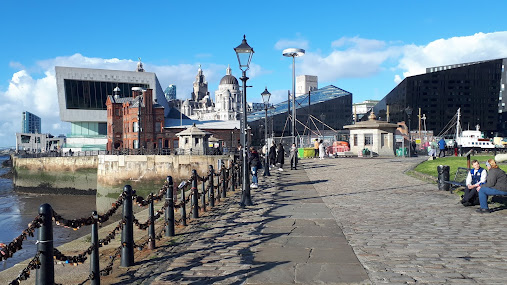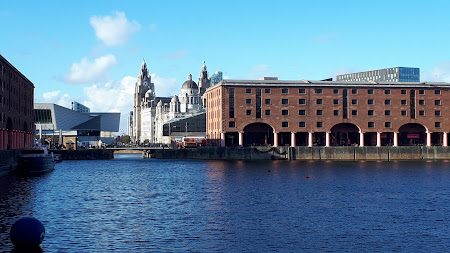I've been thinking about my prejudices again in my long and torturous process of trying to become more of a human being. What prompted this? Strictly Come Dancing, actually.
The final, featuring Rose Ayling Ellis and John Whaite after A J Odudu had to pull out with injury was wonderful heart-warming TV, even if it was too much of a tear-fest for misery mush Piers Morgan.
At the start of the series I couldn't figure out how a deaf person could perform well in a dance competition. But I was even more sure I wouldn't warm to two blokes dancing together. Oh, I've long since stopped having any hang up about gay couples. And I've enjoyed watching blokes dance together before: in particular a rather macho, athletic Cirque du Soleil performance showed breath taking control with slow and precise movements, requiring impressive strength. And blokes dancing together side by side has been well established in song and dance routines for many decades - Bing Crosby and Danny Kaye in White Christmas from 1954 for example. But in ballroom hold?
I was concerned that the producers wouldn't give the full range of dances to John and his partner Johannes Radebe. It's seemed obvious to some of us cynics for many series that some couples seem to get remarkably favourable breaks in what dances they have to do, so I rather expected John and JoJo to be given dances that suited them. In other words to benefit from favouritism from the producers.
For any male celebrity the rumba is a "wild card" which can stymie their chances of making progress, as it is notoriously the hardest dance to get a good score from the judges. OK, I could see a tango or paso doble working but a waltz? A foxtrot? The time in the competition that a contestant has to tackle a particular dance can easily seal their fate. One thing the Beeb has never made clear is how the dances and the music are chosen. I assume it's not random...
In the event it was Rhys Stephenson who arguably got the favours - no rumba and not much ballroom either, after week one. He was a decent dancer but so much better out of hold so I wondered whether this was the Beeb protecting its own, Stephenson being a CBeebies presenter.
My fears about John and Johannes though were totally unfounded. They were given the rumba in week 7 which could have proved very dangerous for their prospects. But they produced such a good and compelling dance that, when it they repeated it in the final, it equalled the best ever score for a rumba in a main series of Strictly - 39 points (Craig has only ever given a rumba a ten in a Christmas special). The only male celebrities to achieve that previously have been Matt Di Angelo, way back in 2007 and the imperious Jay McGuinness of Pulp Fiction jive fame in 2015.
Indeed John was given more ballroom than latin dances. While he was very competent at ballroom this didn't do him any favours. Possibly to avoid the ballroom dances looking too much like a pastiche (ok, guilty, I suppose I mean "too gay") Johannes choreographed the dances with the two men alternating as lead. While this worked well it increased the degree of difficulty. Although John coped well with it the simple fact is it didn't always look "right". And if it doesn't look like a tango, guess what: it isn't a tango. This was reflected in the judges scores.
Perhaps surprisingly, Rose had the lowest average score going into the final. She had the highest average ballroom score of the semi-finalists but much the lowest latin score. I don't remember the exact number and I'm not going to crunch a spreadsheet but it was below 30. Indeed, she was perhaps fortunate not to get a latin dance after week 7. John had the highest average score and the highest latin score of the finalists with a ballroom score of about 32. A J was actually the best all-round dancer, with a very even split between ballroom and latin, around 34. It was unfortunate she couldn't compete in the final but I suspect she also couldn't compete with the narrative Rose and John had going with the public.
And anyway, although the Beeb's data crunchers never seem to leak, we can be pretty sure Rose's public vote was off the scale all through the competition. There could only be one winner - and she was a worthy winner. It was wonderful to watch her grow in confidence through the series and to see how her professional partner, Giovanni Pernice, rose to the challenge (sorry) of communicating with her, empathically as much as telepathically. Unlike rumba, "Couples Choice" is an open invitation to a high score, but their dance was exceptionally moving. And her "leap of faith" into Gio's outstretched hands in her American Smooth was the "wow" moment of the series for me. (Though John and JoJo's bagette sequence in the Charleston was memorable. No, "baguette" isn't a euphemism: if you haven't seen it, find the video and watch).
On the night, if I'd had to choose, I would have voted for John.
So in the end I had no problem with two blokes dancing ballroom together. There is a proviso, though. We warm to contestants on shows like Strictly partly by how they respond to the challenge as competitors and partly by what they're like as people. Though you can never fully see the real person on the screen, John Whaite seems to be a fantastic bloke: warm, cheerful, friendly, talented - so light on his feet and by far the most precise dancer of the finalists from what we could see - and hugely supportive of his rather touchingly emotional pro partner. He didn't expect to win on the night and didn't seem too bothered either way. He wanted to give of his best and he gave us wonderful entertainment. For example:
Part of the reason I didn't know beforehand if I could stomach two blokes dancing in Strictly was because I hadn't enjoyed watching two women dancing together in the previous series. But the reason for this is now completely clear to me. Unlike some people I have no problem with Nicola's partner, Katya Jones, who seemed to lose public support over a dalliance with her partner in 2018, Seann Walsh. What I remember is her amazing choreography for their Matrix themed dance in musicals week, with its portrayal of the slo-mo bullet dodging scene. What was really amazing was that it transpired Walsh wasn't actually a very good dancer, but boy she made him look like one that week. So my problem was with Nicola, whose exploits I had admired winning her boxing golds at the 2012 and 2016 Olympics. It turned out she didn't come across as likeable. Worse, she was one of those contestants who thinks she is doing much better at dancing than she actually is.
For me that's not prejudice: I'm entitled to not like people.
And I've decided reality TV does have a purpose. It allows us to identify with people from different backgrounds to ourselves, be it Rose and the deaf community, John's wonderful warmth as a gay man, AJ's ebullient enthusiasm, albeit always on the verge of becoming over-powering or some vacuous tattoed contestant in Love Island. We can see the world for a moment through the eyes of others.
And understand a little bit more, empathise a bit more and, hopefully, become more inclusive and accepting of people as a result.
Of course, it was great entertainment too, otherwise I wouldn't watch.
And no, I don't watch Love Island and don't intend to start. There are limits!











